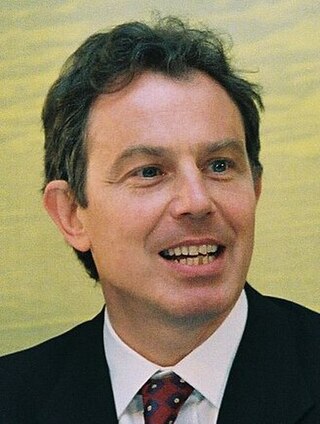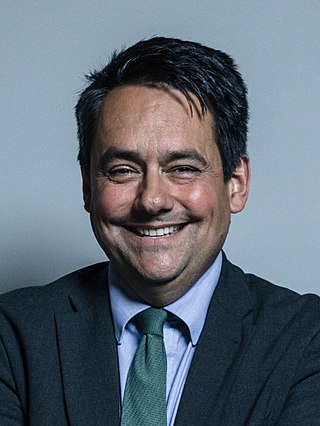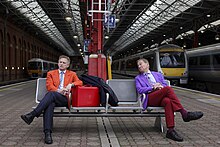
The 2001 United Kingdom general election was held on Thursday 7 June 2001, four years after the previous election on 1 May 1997, to elect 659 members to the House of Commons. The governing Labour Party led by the prime minister Tony Blair was re-elected to serve a second term in government with another landslide victory with a 165-seat majority, returning 412 members of Parliament versus 418 from the previous election, a net loss of six seats, although with a significantly lower turnout than before—59.4%, compared to 71.6% at the previous election.

The 1997 United Kingdom general election was held on Thursday, 1 May 1997. The governing Conservative Party led by Prime Minister John Major was defeated in a landslide by the opposition Labour Party led by Tony Blair, achieving a 179-seat majority and a total of 419 seats.

Michael Denzil Xavier Portillo is a British journalist, broadcaster, and former Conservative Party politician. His broadcast series include railway documentaries such as Great British Railway Journeys and Great Continental Railway Journeys. A former member of the Conservative Party, he was Member of Parliament (MP) for Enfield Southgate from 1984 to 1997 and Kensington and Chelsea from 1999 to 2005.

Stephen Daniel Twigg is a British Labour Co-op politician who has served as the 8th Secretary-General of the Commonwealth Parliamentary Association since August 2020. He served as Member of Parliament for Enfield Southgate from 1997 to 2005, and for Liverpool West Derby from 2010 to 2019.

South West Norfolk is a constituency represented in the House of Commons of the UK Parliament since 2024 by Terry Jermy of the Labour Party. It was previously represented by Liz Truss of the Conservative Party between 2010 and 2024.

Enfield Southgate was a constituency in the House of Commons of the UK Parliament. It was created in 1950 as Southgate.

Kensington and Chelsea was a constituency represented in the House of Commons of the Parliament of the United Kingdom 1997–2010. It was one of the safest Conservative seats in the United Kingdom, and since its creation in 1997 became a prestigious seat, with MP Alan Clark, the former Defence Secretary Michael Portillo and the former Foreign Secretary Malcolm Rifkind all holding the seat for the Conservatives. The seat was abolished for the 2010 election, when the 1974–1997 Kensington constituency was recreated and Chelsea formed a new constituency together with the southern part of the former Hammersmith and Fulham constituency, called the Chelsea and Fulham constituency.

The 2005 United Kingdom general election was held on Thursday 5 May 2005, to elect 646 members to the House of Commons. The governing Labour Party led by the prime minister Tony Blair won its third consecutive victory, with Blair becoming the second Labour leader after Harold Wilson to form three majority governments. However, its majority fell to 66 seats; the majority it won four years earlier had been of 167 seats. The UK media interpreted the results as an indicator of a breakdown in trust in the government, and especially in Blair.

The 2010 United Kingdom general election was held on Thursday 6 May 2010, to elect Members of Parliament to the House of Commons. The election took place in 650 constituencies across the United Kingdom under the first-past-the-post system. The election resulted in a large swing to the opposition Conservative Party led by David Cameron similar to that seen in 1979, the last time a Conservative opposition had ousted a Labour government. The governing Labour Party led by the prime minister Gordon Brown lost the 66-seat majority it had previously enjoyed, but no party achieved the 326 seats needed for a majority. The Conservatives won the most votes and seats, but still fell 20 seats short. This resulted in a hung parliament where no party was able to command a majority in the House of Commons. This was only the second general election since the Second World War to return a hung parliament, the first being the February 1974 election. This election marked the start of Conservative government for the next 14 years.

David John Barrington Burrowes is a British politician. He was the Conservative Member of Parliament for Enfield Southgate from 2005 to 2017, is the co-founder of the Conservative Christian Fellowship. He has been the Chairman of the Equity Release Council since 2017

The Conservative Party is the oldest political party in the United Kingdom and arguably the world. The current party was first organised in the 1830s and the name "Conservative" was officially adopted, but the party is still often referred to as the Tory party. The Tories had been a coalition that often formed the government from 1760 until the Reform Act 1832. Modernising reformers said the traditionalistic party of "Throne, Altar and Cottage" was obsolete, but in the face of an expanding electorate from the 1830s to 1860s, it held its strength among royalists, devout Anglicans and landlords and their tenants.
John Leslie Marshall is a British Conservative politician.
The 1984 Enfield Southgate by-election was a parliamentary by-election held on 13 December 1984 for the House of Commons constituency of Enfield Southgate.

The Conservative Party Conference (CPC) is a four-day national conference event held by the Conservative Party in the United Kingdom. It takes place every year in October during the British party conference season, when the House of Commons is usually in recess. The event's location has alternated between Birmingham's International Convention Centre (ICC) and Manchester's Central Convention Complex since 2008. Previously, it had alternated between Blackpool, Bournemouth and Brighton. In contrast to the Liberal Democrat Conference, where every party member attending its Conference, either in-person or online, has the right to vote on party policy, under a one-member, one vote system, or the Labour Party Conference, where 50% of votes are allocated to affiliated organisations, and in which all voting is restricted to nominated representatives, the Conservative Party Conference does not hold votes on party policy.
This is the results breakdown of the 2005 general election.
The constituency of Enfield Southgate returned a memorable result in the 1997 United Kingdom general election, when the seat's incumbent Member of Parliament, the Conservatives' Michael Portillo, lost to Labour's Stephen Twigg.

John Major formed the second Major ministry following the 1992 general election after being invited by Queen Elizabeth II to begin a new government. His government fell into minority status on 13 December 1996.

The 2005 United Kingdom general election in England took place on 5 May 2005 for 529 English seats in the British House of Commons. The governing Labour Party under Tony Blair won an overall majority of seats for the third successive election.
Unseating is a political term which refers to a legislator who loses their seat in an election. A legislator who is unseated loses the right to sit in a legislative chamber. A landslide victory results in many legislators being unseated.
An election took place in the East Anglia constituency of South West Norfolk on 4 July 2024, as part of the 2024 general election. Liz Truss, the shortest-serving British prime minister in history, was standing for re-election as MP. On 2 July, in anticipation of a large Labour victory in the general election, a national poll of voters by Portland Communications had shown that Truss was the Conservative politician most people (28%) wanted to see lose their seat.














